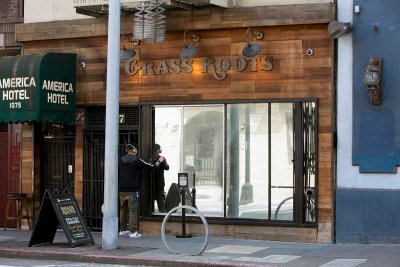San Francisco’s cannabis industry is expected to hang on to a bit more green next year due to a tax break that is likely to pass next week.
Supervisor Rafael Mandelman has proposed the one-year tax reprieve, delaying the implementation of the cannabis tax approved by voters in November 2018.
The estimated tax break and revenue loss to The City is $7.1 million, according to the budget analyst.
Mandelman said he intentionally waited to move the proposal forward until after Tuesday’s election,which included three tax measures expected to generate money for the general fund: Propositions F, a business tax reform measure; Proposition I, an increase in the real estate transfer tax; and Proposition L, a surcharge on gross receipts if a CEO earns a lot more than the company’s workers.
“There is going to be new revenue coming into the city,” Mandelman said. “I think in light of that, in light of our efforts to support small businesses, this is not a time to be imposing a new tax on small businesses,” Mandelman said.
The Board of Supervisors Budget and Finance Committee approved of the proposal Wednesday. The full board is expected to vote on it Tuesday.
Madelman argued that a tax break was needed because when voters approved Proposition D in 2018, imposing a tax, it was anticipated the industry would have grown a lot faster than it has. Instead, city permitting delays at the outset have slowed that growth.
“While approvals have been happening more quickly over the last year than previously, many of these businesses have been paying rent on their empty locations for years and need time to grow their businesses and recoup some of these costs,” Mandelman said.
The proposal has the backing of the Office of Cannabis.
Mandelman also highlighted some other financial challenges facing the cannabis industry, including a 15 percent state excise tax and IRS code section 280 that prohibits cannabis retailers from taking the usual business deductions on expenses like payroll and marketing that would otherwise lower their federal tax burden.
“The California state Legislative Analyst’s Office has concluded that reducing cannabis tax rates would expand the legal market and reduce the size of the illicit market,” Mandelman said.
The tax hike is scheduled to go into effect Jan. 1, unless his legislation passes.
David Goldman, who sits on the board of directors for The Green Cross, a cannabis dispensary in the Excelsior, said the tax hike would only increase costs for consumers, hindering access, and promote the illicit market.
“According to the accountants of The Green Cross there will be a 7 to 11 percent increase in the price of cannabis,” Goldman said. “I’m a senior on fixed income. I understand what it means to not have much money for cannabis.”
AnnaRae Grabstein, chief compliance officer for NorCal Cannabis Company, which cultivates cannabis, said the tax would exacerbate the difficulties brought on the by COVID-19 pandemic.
“COVID-19 has been tremendously challenging in our cultivation and distribution environment,” Grabstein wrote in a letter to the board. “We have worked diligently to create new safety protocols and have paid financial support to staff to weather this pandemic. This has come at a high cost.”
Grabstein said that “we are not in an economic position to take on additional taxes that other businesses are not subject to in the midst of the pandemic” and warned that “any increase in taxes could cause us to close or force us to relocate out of the City.”
She also noted that efforts to adjust the state taxes on cannabis have stalled due to the pandemic.
“There is a general consensus that over inflated cannabis taxes are threatening the ability of the legal market to mature and compete with illicit operators,” Grabstein said. “Unfortunately, the efforts underway for state level tax reform were sidelined earlier this year by COVID-19 and no progress has been made to date.”
Mandelman’s proposal delays implementation of the tax hike until January 2022. It also makes adjustments to the tax rates.
For example, currently the tax exempts the first $500,000 in gross receipts but that’s proposed to increase to the first $1 million in gross receipts.
For adult retail sales the current tax has two rates, 2.5 percent for up to $1 million in gross receipts and 5 percent for in excess of $1 million. The proposal would apply the 2.5 percent to the first $1.5 million in taxable gross receipts and 5 percent to gross receipt in excess of $1.5 million.
Supervisor Rafael Mandelman has proposed the one-year tax reprieve, delaying the implementation of the cannabis tax approved by voters in November 2018.
The estimated tax break and revenue loss to The City is $7.1 million, according to the budget analyst.
Mandelman said he intentionally waited to move the proposal forward until after Tuesday’s election,which included three tax measures expected to generate money for the general fund: Propositions F, a business tax reform measure; Proposition I, an increase in the real estate transfer tax; and Proposition L, a surcharge on gross receipts if a CEO earns a lot more than the company’s workers.
“There is going to be new revenue coming into the city,” Mandelman said. “I think in light of that, in light of our efforts to support small businesses, this is not a time to be imposing a new tax on small businesses,” Mandelman said.
The Board of Supervisors Budget and Finance Committee approved of the proposal Wednesday. The full board is expected to vote on it Tuesday.
Madelman argued that a tax break was needed because when voters approved Proposition D in 2018, imposing a tax, it was anticipated the industry would have grown a lot faster than it has. Instead, city permitting delays at the outset have slowed that growth.
“While approvals have been happening more quickly over the last year than previously, many of these businesses have been paying rent on their empty locations for years and need time to grow their businesses and recoup some of these costs,” Mandelman said.
The proposal has the backing of the Office of Cannabis.
Mandelman also highlighted some other financial challenges facing the cannabis industry, including a 15 percent state excise tax and IRS code section 280 that prohibits cannabis retailers from taking the usual business deductions on expenses like payroll and marketing that would otherwise lower their federal tax burden.
“The California state Legislative Analyst’s Office has concluded that reducing cannabis tax rates would expand the legal market and reduce the size of the illicit market,” Mandelman said.
The tax hike is scheduled to go into effect Jan. 1, unless his legislation passes.
David Goldman, who sits on the board of directors for The Green Cross, a cannabis dispensary in the Excelsior, said the tax hike would only increase costs for consumers, hindering access, and promote the illicit market.
“According to the accountants of The Green Cross there will be a 7 to 11 percent increase in the price of cannabis,” Goldman said. “I’m a senior on fixed income. I understand what it means to not have much money for cannabis.”
AnnaRae Grabstein, chief compliance officer for NorCal Cannabis Company, which cultivates cannabis, said the tax would exacerbate the difficulties brought on the by COVID-19 pandemic.
“COVID-19 has been tremendously challenging in our cultivation and distribution environment,” Grabstein wrote in a letter to the board. “We have worked diligently to create new safety protocols and have paid financial support to staff to weather this pandemic. This has come at a high cost.”
Grabstein said that “we are not in an economic position to take on additional taxes that other businesses are not subject to in the midst of the pandemic” and warned that “any increase in taxes could cause us to close or force us to relocate out of the City.”
She also noted that efforts to adjust the state taxes on cannabis have stalled due to the pandemic.
“There is a general consensus that over inflated cannabis taxes are threatening the ability of the legal market to mature and compete with illicit operators,” Grabstein said. “Unfortunately, the efforts underway for state level tax reform were sidelined earlier this year by COVID-19 and no progress has been made to date.”
Mandelman’s proposal delays implementation of the tax hike until January 2022. It also makes adjustments to the tax rates.
For example, currently the tax exempts the first $500,000 in gross receipts but that’s proposed to increase to the first $1 million in gross receipts.
For adult retail sales the current tax has two rates, 2.5 percent for up to $1 million in gross receipts and 5 percent for in excess of $1 million. The proposal would apply the 2.5 percent to the first $1.5 million in taxable gross receipts and 5 percent to gross receipt in excess of $1.5 million.




